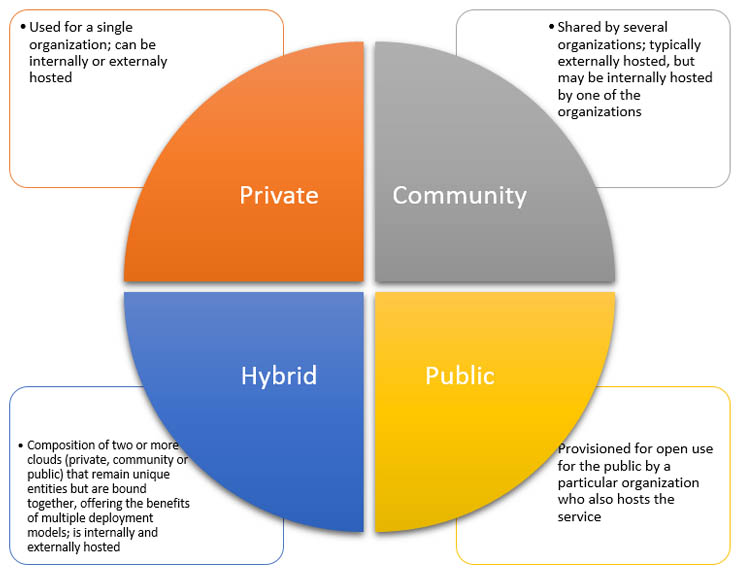Cloud computing enables companies to create and connect to large
pools of organizational databases, thus enabling flexible and convenient
access to the organization’s informational resources. This is
especially suitable for today’s internationalized business models. The
bottom line is thus that all companies today are somehow looking into
cloud computing as a sustainable option for their applications, data and
file storing needs.
Types of Cloud Computing
There are four types of cloud computing that these companies can
choose from, including public, private, hybrid and community cloud. Each
of these types of cloud computing has its unique set of characteristics
that determine whether they are relevant depending on the needs of the
company in question. This means that before choosing a type of cloud
computing the company needs to evaluate their needs and decide on what
to expect from the cloud computing.

Private Clouds
The private clouds are on the other hand dedicated or created and
operated specifically for a given organization. They could be hosted and
managed internally within the organization or externally through a
third party depending on the needs of the organization in question. The
On Premise Private cloud is where the cloud is hosted within the
organization and their IT department takes responsibility for all the
incurred costs and required activities of running an maintaining the
cloud. The externally hosted private cloud on the other hand implies
outsourcing the cloud computing service to a third party without having
to share the infrastructure with another organization. Either way, the
company here is reassured of security and privacy and this type of cloud
computing would work best for an organization that values the privacy
and security of their databases. It is however rather expensive. Such
organizations can meet the cost by also providing cloud computing
services to other organizations at a fee.
Hybrid Clouds
A hybrid cloud incorporates all the above mentioned cloud computing
types in one bundle to provide the convenience of reaping the advantages
of each type of cloud computing. In this kind of cloud, you use two or
more clouds, spreading out your cloud computing needs against the
numerous types for more effective services. You can also host other
organizations given the vast opportunities that are created especially
when you merge a public and a private cloud to create a private cloud
that has been augmented with the unlimited resources of a public cloud.
The challenge is that you will need both on premise infrastructure and
off site server based infrastructure. Hybrids are thus expensive to set
up but cheap to manage as you can offer cloud computing services to many
other organizations at a fee.
Public Clouds
The public clouds have a rather low level of security and available
variances because the cloud here is operated by one service provider who
offers access to the cloud through the internet. The public cloud is
however convenient in cases where there are a lot of users which would
imply a serious standard workload. Also, the public cloud is very cheap
seeing as he cost is spread out across all the users. Google for example
is able to provide cloud computing services at almost no cost at all.
If your company needs an incremental capacity, has a huge workload for
applications and is not keen on high levels of security then the public
cloud will serve you well.
Community Clouds
This involves a private cloud that is shared by a number of
organizations and either managed by all these organizations or by a
third party. Ordinarily, these organizations must have a shared set of
cloud computing requirements in order for customized cloud
characteristics to work effectively for all of them. This kind of cloud
computing is best for large organizations that have numerous independent
departments, like governments and international organizations like the
UN.
Conclusion
Companies have to pick out a cloud computing type based on their
needs and expectations with respect to cloud computing. At this point,
all companies have to be considering the concept of cloud computing
seeing as it is not only convenient but also highly economical in terms
of enabling them to work seamlessly across the globe. Whether you settle
for a public, private, community or hybrid server, cloud computing is
the way to go in business but it will only work if it is relevant to
your organizational needs.


Usually I do not read post on blogs, but I would like to say that this write-up very forced me to try and do it! Your writing style has been surprised me. Great work admin..Keep update more blog..
ReplyDeleteCloud Computing Training in Chennai | SAS Training in Chennai